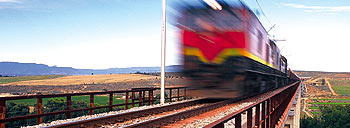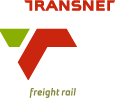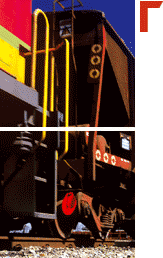
Latest 2010 Media Releases
 Brakspruit Bridge Re-Opened
Brakspruit Bridge Re-Opened
The Brakspruit Bridge has been re-opened following the fateful derailment of a rock phosphate train on the 19th of September 2010 that knocked the first two spans of the bridge from their pillars.
This resulted in the closure of the single line between Phalaborwa and Hoedspruit, severely affecting the export of Rock Phosphate and Magnetite through the Port of Richards Bay. The construction of the temporary bridge using emergency bridge components was completed on 12 November 2010, about a week earlier than the original estimated completion date of 18th November 2010.
Plans are in place to construct a permanent bridge, and it is estimated that it will take about 7 to 8 months to complete.
View Full Media Release as a PDF
 Majuba coal line's improved performance
Majuba coal line's improved performance
Transnet Freight Rail’s transportation of domestic coal from Mpumalanga mines to Eskom’s Majuba Power Station in Standerton has grown by 36% from last year’s throughput of 5,8mt.
The Majuba project has seen a consistent weekly average performance of 155 000 tons in recent weeks, which culminated in an all time record of 170 000 tons in week 28. This project is a key and strategic initiative in power generation by Eskom for the whole country
The Company’s year to date performance for coal to Majuba stands at 7.8mt, with six months still left before the end of the financial year.
According to Transnet Freight Rail’s Acting Chief Executive, Mr Tau Morwe, this achievement came about as a result of collaborative effort and focus by all stakeholders involved in the project. The latter contributed to, amongst others; improved trains Turn Around Times (TAT), infrastructure reliability, safety and security. “The next target for Transnet Freight Rail is the delivery of 8 million tons by March 2011”, says Morwe.
View Full Media Release as a PDF
 Coal line improved performance
Coal line improved performance
Transnet Freight Rail has delivered a record 17,7million tons of coal to the RBCT for the quarter July to September 2010, representing a 16% increase on volumes railed in the same period last year. The company has sustained a monthly tempo of 5.7mt for July and August, topped by 6.2mt for September.
Tau Morwe, Transnet Freight Rail’s acting Chief Executive, attributes this sterling performance to “team work displayed by all role players, improved planning and deviation management, maintenance and optimal utilization of resources”. Morwe is confident of further improved performance in the third quarter and of growing the business to reach the long term plan of delivering 81million tons per annum to RBCT.
View Full Media Release as a PDF
 Derailment in Phalaborwa
Derailment in Phalaborwa
An 80–wagon freight train was travelling from Phalaborwa in the Limpopo province to Richards Bay in KwaZulu Natal when 15 of its wagons derailed causing serious damage to a bridge on which the track runs. The line will be closed until all repairs have been completed and early indications are that the repair work may take up to eight weeks
Transnet Limited, through its division Transnet Freight Rail, is working with Phalaborwa Mining Company and Foskor, the clients affected by Sunday’s (19 September 2010) incident, to find urgent solutions to meet their transport needs while the company carries out repairs. The derailment of the train carrying rock phosphate occurred at Brakspruitbrug between Hoedspruit and Phalaborwa.
View Full Media Release as a PDF
 TFR Wins Cable Theft Battle
TFR Wins Cable Theft Battle
Transnet Freight Rail has reduced the length of cable stolen from its rail network between May and August 2010 by 77%. The company has also deacreased its monthly average of stolen cable by 52%, compared to last year’s monthly averages.
In may 2010, the Company recorded 47 kilometres of cable stolen, which has steadily declined to 11 kilometres in August.
The theft of overhead cables on the rail line last year reached unprecedented levels, with an average of 10 trains cancelled per day due to cable theft. The direct cost to the company (replacement cost for cable only) was more than R42 million per year and the consequential losses due to the knock on effect ran into many millions more. This figure has been significantly reduced with the ultimate target to reducing cable theft incidents by 30% year on year until it is completely eradicated.
TFR Acting Chief Executive Tau Morwe, ascribes the success in tackling cable theft to a focused strategy in which the Company intensified its data gathering and intelligence operations by 50% which included land and air surveillance and also involved close co-operation with law enforcement units like the Hawks and SAPS Crime Intelligence.
View Full Media Release as a PDF
 Iron Ore Line Derailment
Iron Ore Line Derailment
The iron ore line will re-open for train traffic at 18:00 tonight. This follows the derailment of a loaded iron ore train (342-wagon RDP train) at 16:00 on Thursday 22nd July 2010 just outside Vredendal.
There were no injuries or fatalities. Of the 342 wagons, 107 wagons derailed. 2 locomotives derailed and were seriously damaged (1 diesel and 1 electrical locomotive). There was also extensive damage to the overhead track equipment, rail track, bridge and rolling stock.
Engineers and repair teams have worked around the clock and all repair work to the bridge, overhead track equipment and railway track that were damaged as a result of the derailment has been completed.
Almost all the iron ore that spilled in the dry river bed below the bridge on which the train partially derailed has been removed. Although the iron ore is a non-toxic metal, to ensure best practice and compliance, representatives from the Department of Environmental Affairs are working in conjunction with Transnet Freight Rail Officials on a rehabilitation programme for the site.
View Full Media Release as a PDF
 Blue Train Scoops Africa’s Leading Luxury
Blue Train Scoops Africa’s Leading Luxury
Train Award
The Blue Train, yesterday, 7 July 2010, was voted as Africa’s Leading Luxury Train at The World Travel Awards held at the Sandton Convention Centre.
Votes were cast by 183,000 travel professionals who include travel agencies, tour and transport companies as well as tourism organizations in 162 countries across the globe.
This esteemed event, known amongst its industry players as the ‘Oscars” of the world travel and tourism, serves to stage celebrations to acknowledge companies across the globe for their contribution to world-class travel & tourism.
For over half a century South Africa’s Blue Train has enjoyed an international reputation as one of the world’s pre-eminent luxury rail- cruise experiences. Traversing South Africa’s varied landscapes the train combines all the comfort and luxury of a five-star hotel with a globally unparalleled journey.
View Full Media Release as a PDF
 Transnet Announces End of Strike
Transnet Announces End of Strike
Transnet is pleased to announce that it has settled the three-week long strike following the signing today of the wage settlement agreement with Satawu.
In terms of an addendum to the pay increase deal agreed and signed with Utatu, the majority union at Transnet, last Friday, we have created a once-off incentive which will be payable to all bargaining sector employees on June 27th 2010. This settles the wage dispute and ensures the remaining striking workers return to work as early as tomorrow (Friday, May 28th 2010).
Mr Wells (Acting CE of Transnet) says:
“Now that the dispute which led to the strike is behind us, I wish to thank all the substantial number of dedicated staff who have kept critical commodity flows moving at levels of efficiency, safety and productivity that have made us all proud. Our rail and pipeline teams have kept the jet fuel supply at capacity and the supply of petroleum by our pipelines to the inland market continued as normal. The port teams have worked hard to bring in every ship and handle every Fifa-related container delivered to our ports and move priority containers.
“We have also managed to move many other priority commodities, and we are working day and night to reduce the backlog. As an example, the efficiency in the Durban Container Terminal moved up to world class levels on certain shifts (such as 30 gross crane moves per hour)”.
During the strike, our rail freight teams have delivered all the required coal to Eskom. “Our engineering teams have kept our fleets safe and repaired damage as a result of sabotage in record time. With skeleton teams, the rehabilitation, maintenance and engineering unit has worked around the clock to clear derailments and deliver on the maintenance requirements on
the ore line.
South Africa owes these employees a debt of gratitude for their heroic and selfless contribution in keeping our services operational during the strike”, says Mr Wells.
 TFR to boost Limpopo
TFR to boost Limpopo
Transnet Freight Rail is set to reduce the cost of transportation of fruit in Limpopo from R1.9 billion to R1.7 billion over the next five years. This is provided that TFR gains 35% of the fruit producers transport share. This in turn will reduce the number of road trucks annually transporting citrus fruit to the Port from 55 000 trips to 32 000 which will drastically reduce the carbon footprint of citrus from 56 million tons of CO2 to a more acceptable 25 million tons.
This exciting news follows collaborative partnership discussions between TFR and the Departments of Road and Transport, Agriculture and Economic Development in Limpopo.
The Province is responsible for 30% of the country’s citrus and 45% of South Africa’s Valencia exports. Freight Rail transported a mere 5% of this in 2009. “Increased road transportation costs, congestion on the roads as well as the deteriorating state of some of the roads have necessitated a re-think on how best to enhance the profitability of the agricultural sector in Limpopo and rail is in a position to do just that”, said Themba Gwala, TFR General Manager, Container and Automotive business.
Transnet Freight Rail’s corridor focused approach, its integration with the Ports as well as its ability to support intermodal growth by consolidation, access and transhipment has seen the Company gain market share in this highly competitive industry. “The growth of rail-based container volumes supports the National interest because it alleviates congestion on the national road network and reduces the cost of logistics in South Africa”, said TFR acting Chief Executive Tau Morwe,.
View Full Media Release as a PDF
 Overhead Cable Theft Causes
Overhead Cable Theft Causes
Serious Disruptions to Rail Service
Cable thefts in the Sentrarand complex, on the Natal corridor and the Eastern corridor (which incorporates the export coal line) on Tuesday, the 16th February 2010 seriously disrupted Transnet Freight Rail’s traffic flow between Johannesburg and Durban; the export coal line from Ermelo to Richard’s Bay; and Bethlehem to Harrismith. The commodities affected varied from cement, coal, iron ore, cars, and container traffic and also included passenger trains.
The theft of overhead cables on the rail line has reached unprecedented levels, with an average of 10 trains cancelled per day due to cable thefts. The direct cost to the company (replacement cost for cable only) is more than R42 million per year and the consequential losses due to the knock on effect runs into many millions more.
This hurts not only TFR and its customers but South Africa as a whole, because when consignments fail to reach their international destinations on time the country’s reputation suffers because overseas markets view us as unreliable and inefficient and could switch to other suppliers.
The consequence of cable theft is not limited to financial losses but can also result in human disaster and tragedy. Cable thefts also often lead to the destruction of Freight Rail assets such as locomotives and wagons and can cost the company millions of rands in repairs and replacement.
Transnet Freight Rail’s “production floor” is the entire South Africa and the Company is faced with the challenge of having to secure some 20 000 km of rail track. The Company runs some 800 trains per day with more than 8 000 loaded wagons on this network.
The sheer size of this operation calls for meticulous planning and what is not often appreciated is the implications on operations following overhead cable theft. Each incident necessitates re-planning and re-allocation of resources which lead to delays for which TFR pays the ultimate price in reputation damage.
Nonetheless hot-spots have been identified, several syndicates arrested and innovative technology applied, such as replacing the overhead copper wire cables with tiger wire which doesn’t have a high resale value. The Company is also working closely with the criminal justice system to ensure that the full might of the law is applied to those found guilty.

